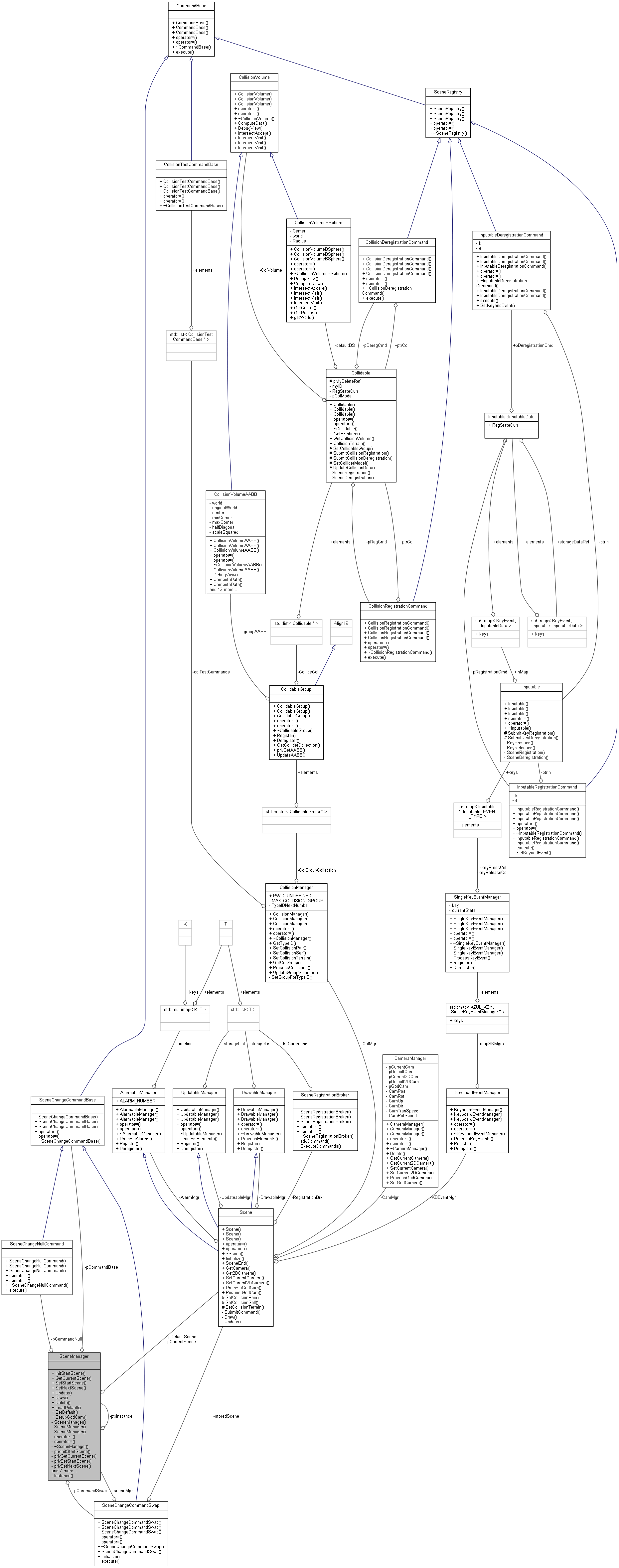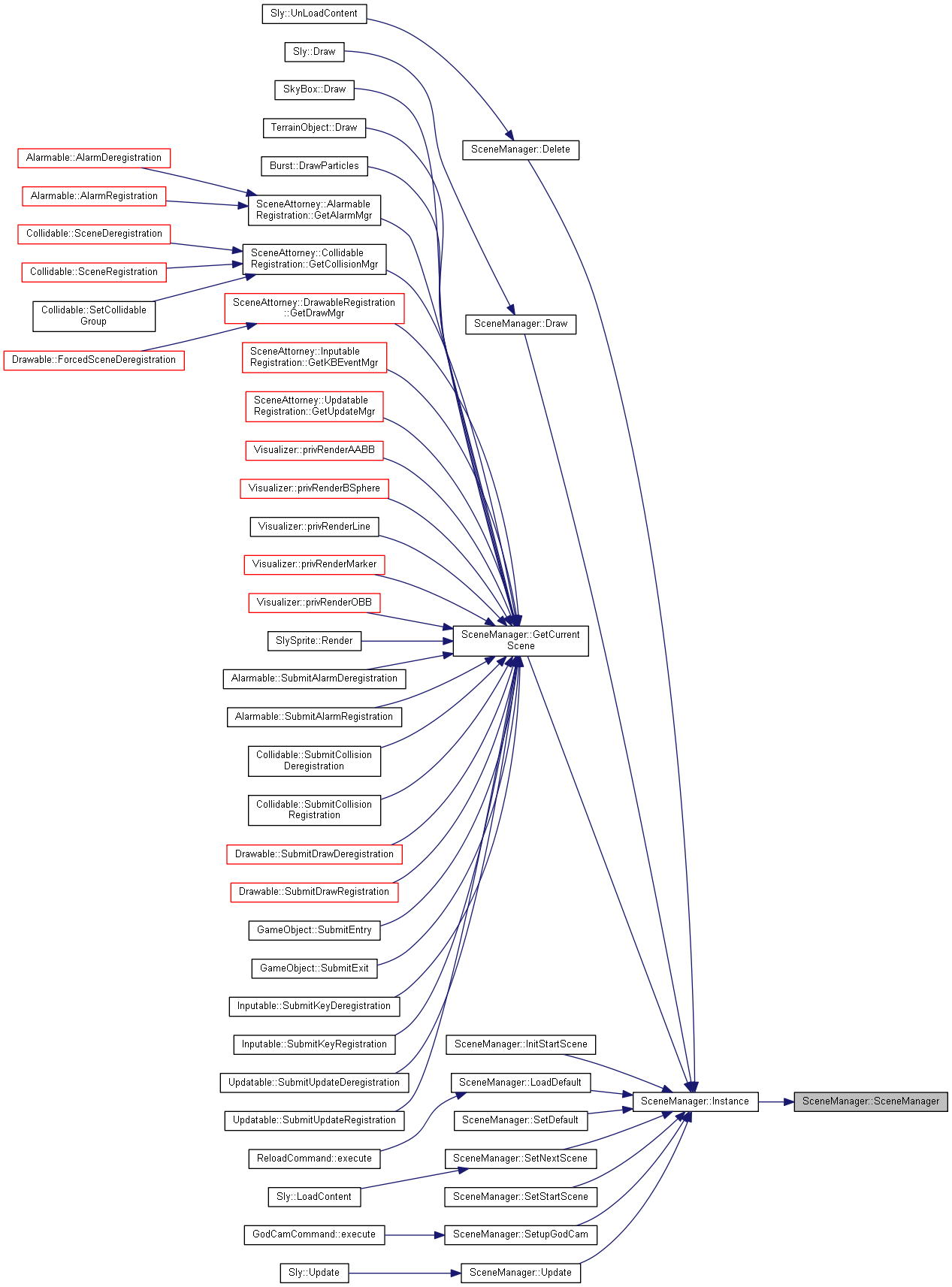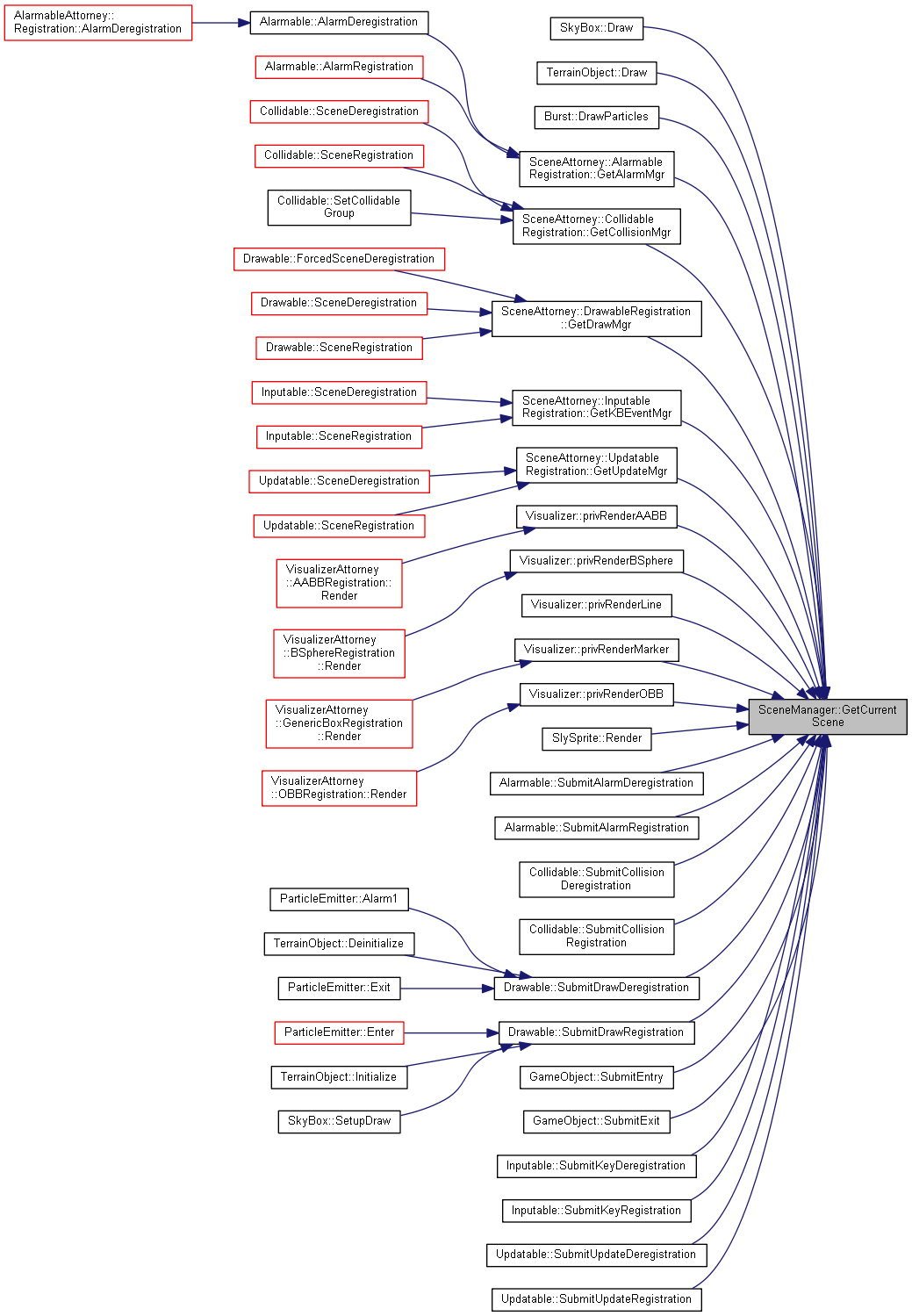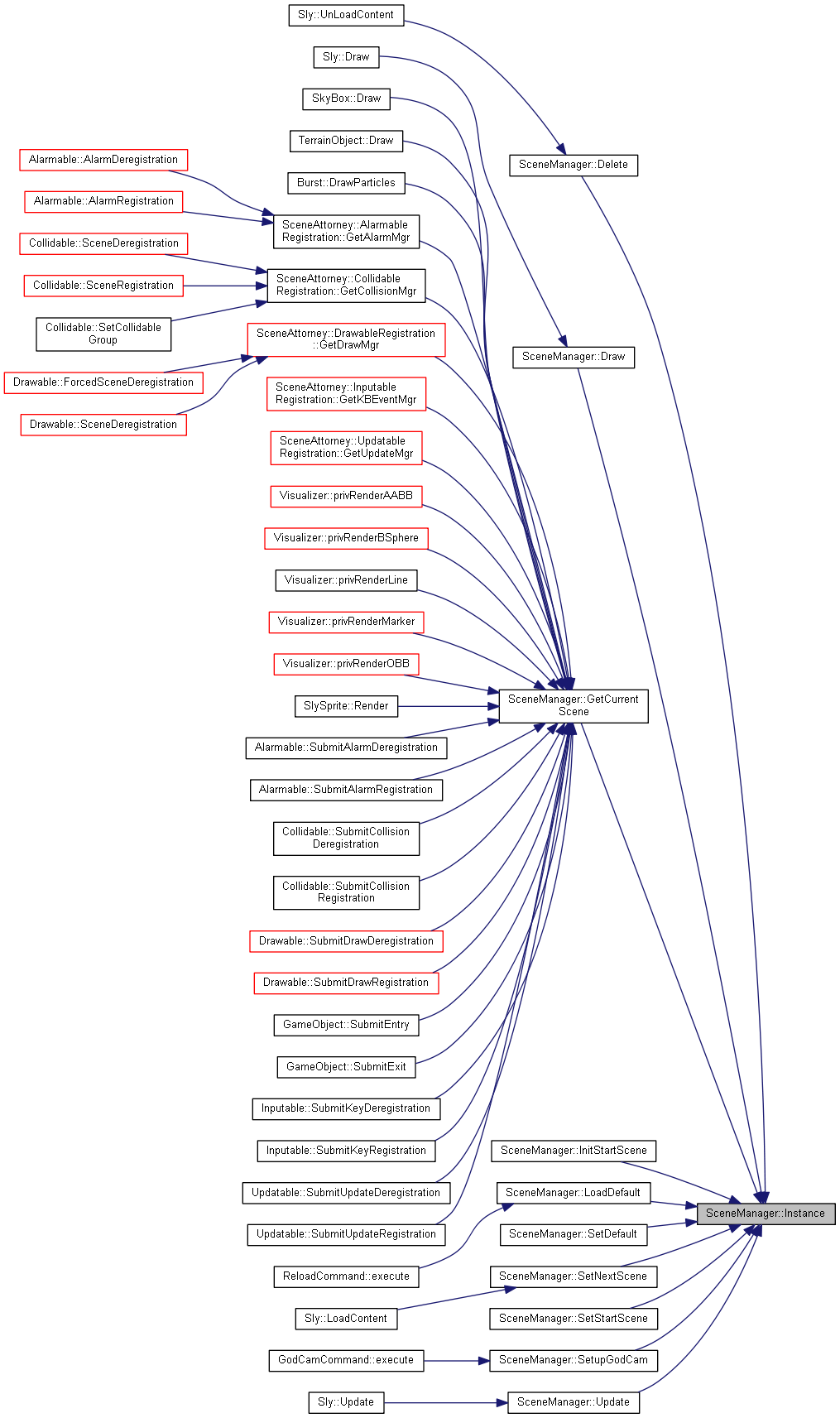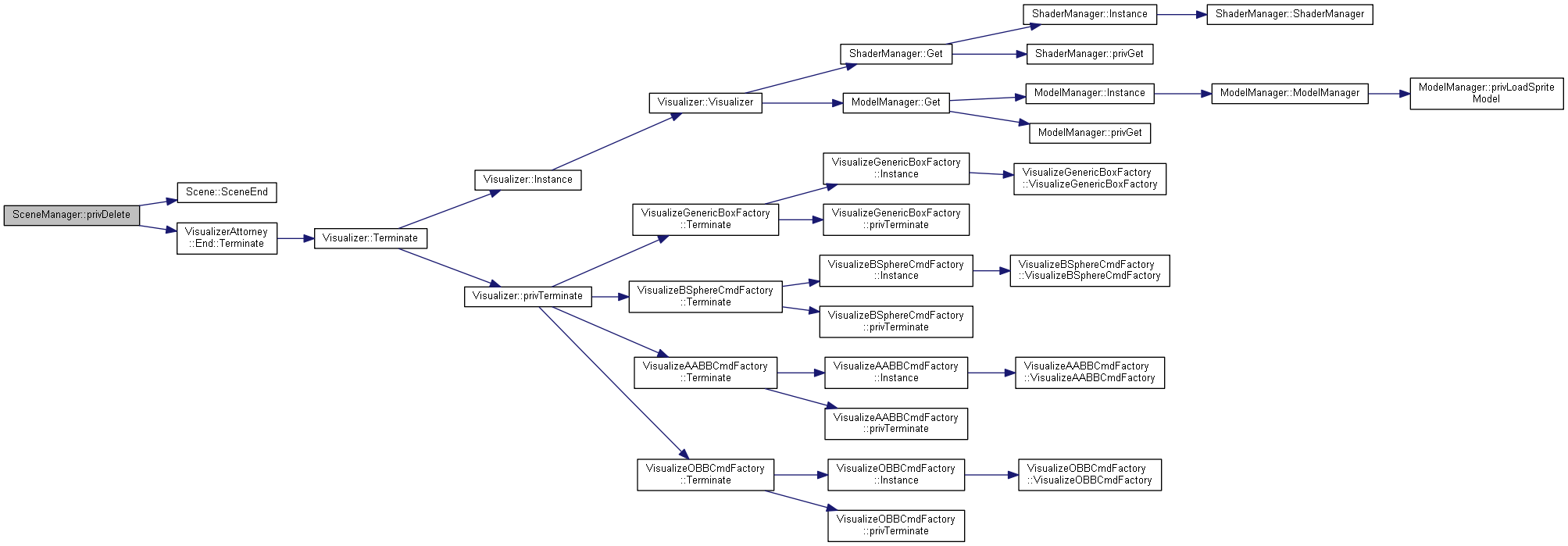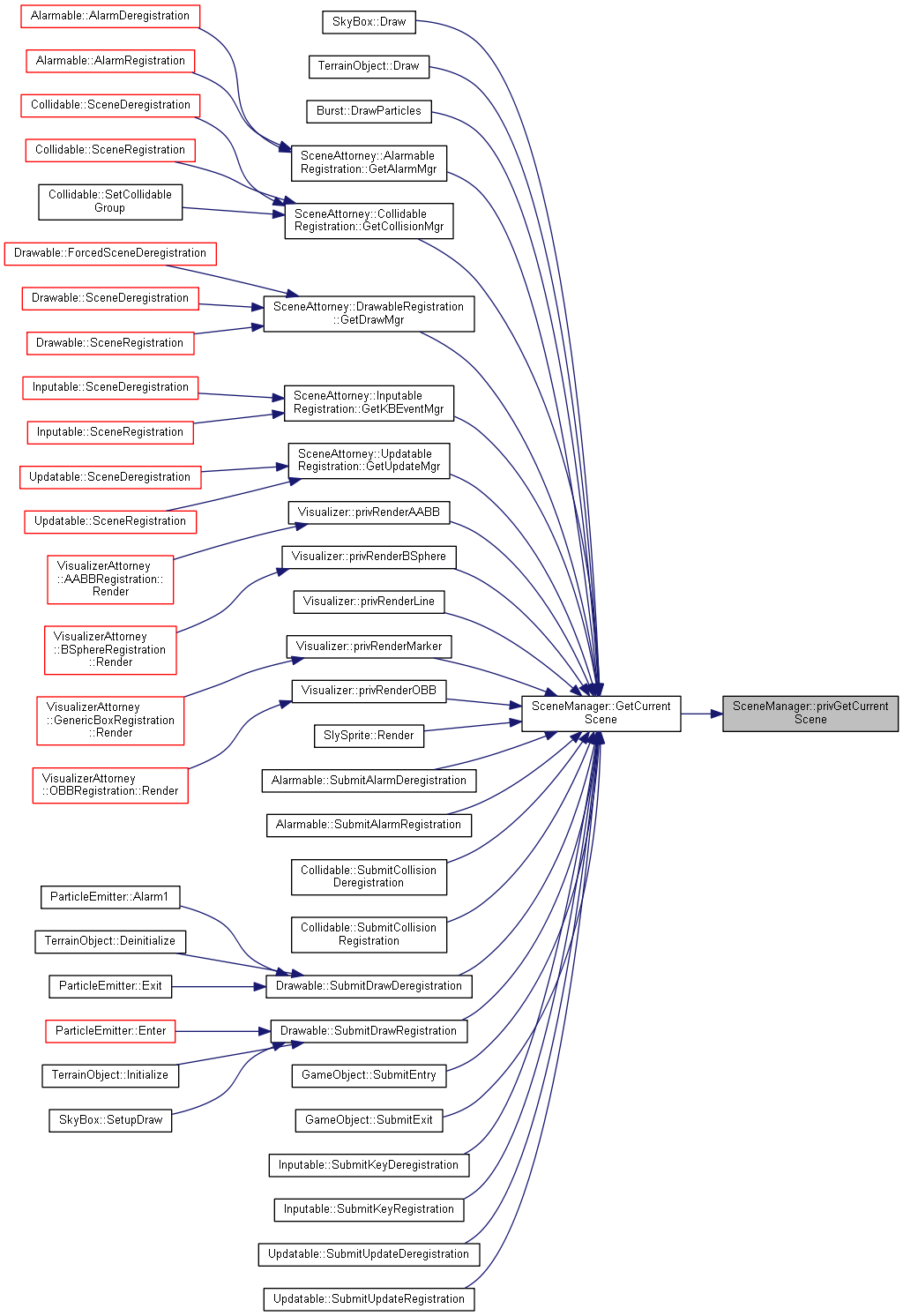#include <SceneManager.h>
◆ SceneManager() [1/3]
| SceneManager::SceneManager |
( |
| ) |
|
|
private |
◆ SceneManager() [2/3]
◆ SceneManager() [3/3]
◆ ~SceneManager()
| SceneManager::~SceneManager |
( |
| ) |
|
|
privatedefault |
◆ Delete()
| static void SceneManager::Delete |
( |
| ) |
|
|
inlinestatic |
Deletes the scene swap commands and pointer instance.
◆ Draw()
| static void SceneManager::Draw |
( |
| ) |
|
|
inlinestatic |
Calls the current scene's draw loop.
◆ GetCurrentScene()
| static Scene * SceneManager::GetCurrentScene |
( |
| ) |
|
|
inlinestatic |
Gets current scene.
- Returns
- Null if it fails, else the current scene.
◆ InitStartScene()
| static void SceneManager::InitStartScene |
( |
| ) |
|
|
inlinestatic |
Initializes the start scene.
Starts up the first scene. First scene is defined within this function which is passed to pCurrentScene.
◆ Instance()
◆ LoadDefault()
| static void SceneManager::LoadDefault |
( |
| ) |
|
|
inlinestatic |
◆ operator=() [1/2]
◆ operator=() [2/2]
Move assignment operator.
◆ privChangeScene()
| void SceneManager::privChangeScene |
( |
Scene * |
nextScene | ) |
|
|
private |
Private change scene.
- Parameters
-
| nextScene | The next scene to be loaded. |
Performs the act of closing the current scene and starting the next one. The scene Initialization is called here.
◆ privDelete()
| void SceneManager::privDelete |
( |
| ) |
|
|
private |
Private delete.
Deletes the existing commands and the pointer instance for SceneManager.
◆ privDraw()
| void SceneManager::privDraw |
( |
| ) |
|
|
private |
Private draw.
Calls draw on the current scene.
◆ privGetCurrentScene()
| Scene * SceneManager::privGetCurrentScene |
( |
| ) |
|
|
private |
Priv get current scene.
- Returns
- Null if it fails, else a pointer to the current Scene.
◆ privInitStartScene()
| void SceneManager::privInitStartScene |
( |
| ) |
|
|
private |
Private initialize start scene.
◆ privReloadDefault()
| void SceneManager::privReloadDefault |
( |
| ) |
|
|
private |
Priv reload default.
Deletes the current scene and loads the default back
◆ privSetDefault()
| void SceneManager::privSetDefault |
( |
Scene * |
newScene | ) |
|
|
private |
Priv set default.
- Parameters
-
| [in,out] | newScene | If non-null, the new scene. |
Sets the default scene to the user specified one
◆ privSetNextScene()
| void SceneManager::privSetNextScene |
( |
Scene * |
nextScene | ) |
|
|
private |
Private set next scene.
- Parameters
-
| [in,out] | nextScene | If non-null, the next scene. |
Readies the command for a scene change. pCommandSwap is initialized with the next scene data.
◆ privSetStartScene()
| void SceneManager::privSetStartScene |
( |
Scene * |
startScene | ) |
|
|
private |
Private set start scene.
- Parameters
-
| [in,out] | startScene | If non-null, the start scene. |
◆ privSetupGodCam()
| void SceneManager::privSetupGodCam |
( |
| ) |
|
|
private |
Private call to setup god camera.
Sets the god camera up for usage. Notably useful for the "noclip" command or "god camera command."
◆ privUpdate()
| void SceneManager::privUpdate |
( |
| ) |
|
|
private |
Priv update.
Executes the scene swap resulting in either a NoOp or a scene change. Afterwards, called scene update.
◆ SetDefault()
| static void SceneManager::SetDefault |
( |
Scene * |
newScene | ) |
|
|
inlinestatic |
Sets up what scene should be loaded as the default startup.
- Parameters
-
| [in,out] | newScene | If non-null, the new scene. |
This function was created with the "reload" console command in mind.
◆ SetNextScene()
| static void SceneManager::SetNextScene |
( |
Scene * |
nextScene | ) |
|
|
inlinestatic |
Sets next scene.
- Parameters
-
| [in,out] | nextScene | If non-null, the next scene. |
◆ SetStartScene()
| static void SceneManager::SetStartScene |
( |
Scene * |
startScene | ) |
|
|
inlinestatic |
Sets start scene.
- Parameters
-
| [in,out] | startScene | If non-null, the start scene. |
◆ SetupGodCam()
| static void SceneManager::SetupGodCam |
( |
| ) |
|
|
inlinestatic |
◆ Update()
| static void SceneManager::Update |
( |
| ) |
|
|
inlinestatic |
Calls the main update loop for the current scene.
Checks for a scene change command and if present, executes it. Proceeds with calling the current scene's update loop.
◆ SceneManagerAttorney
◆ pCommandBase
Base command for Swap and Null commands.
◆ pCommandNull
NonOp command for swapping the scene.
◆ pCommandSwap
Command to swap to a new scene.
◆ pCurrentScene
| Scene* SceneManager::pCurrentScene |
|
private |
Keeps track of the currentScene registered.
◆ pDefaultScene
| Scene* SceneManager::pDefaultScene |
|
private |
◆ ptrInstance
The documentation for this class was generated from the following files:


